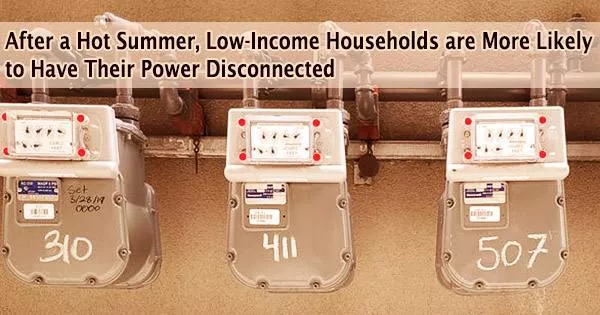When temperatures in California exceed 95 degrees Fahrenheit, low-income families are more likely than other homes to have their electricity cut off two to three months later. Why? Because that’s when clients get notices that their utility bills from those scorching days are past due.
The findings are from a new UCLA-led study published in Nature Energy.
“For low-income households, having just one hot day during the August billing period can lead to a 1.2% increase in the chance of being disconnected in October,” said Alan Barreca, a UCLA economist and lead author of the study.
Low-income households have unique difficulties adjusting to extreme heat events. Higher bills caused by increased energy use, such as increased air conditioning use, force some families to make difficult choices. Paying energy bills may require giving up food or other necessities, but failing to do so may result in utilities being cut off.
In addition, many low-income households in Southern California lack any form of air conditioning, making it risky to skip using air conditioning during a heat wave. (According to a Brookings Institution report, 20% of households in the city of Los Angeles lack air conditioning.)
For low-income households, having just one hot day during the August billing period can lead to a 1.2% increase in the chance of being disconnected in October.
Alan Barreca
“We don’t want people to stop using energy, because we need them to be adapting and protecting themselves,” Barreca said. “And we simultaneously want there to be little financial distress later on when they get their bill.”
For the study, researchers reviewed the account histories of 300,000 low-income households between January 2012 and August 2017, using data from Southern California Edison, which serves more than 15 million Southern Californians. Families with family incomes below 200% of the federal poverty limit were the subject of the study.
The average household’s summer electricity cost in the research was $101.66. However, researchers discovered that electricity costs rose by $1.60 for each extra day with temperatures at least 95 degrees Fahrenheit. For each subsequent day that the temperature exceeded 100 degrees Fahrenheit, the increase was $2.92 per day.
Those increases could easily add up to an additional $20 to $30 per bill. For some Californians, that might not seem like a significant hike, but for low-income families, the added cost can be disastrous.
According to several surveys, between 60% and 70% of Americans are predicted to be living paycheck to paycheck in 2022, which might make it difficult to handle unforeseen costs. According to Barreca, the study was designed to look at how an increase in the frequency of days with high temperatures due to climate change would make this issue even worse.
According to the report, low-income households would be 12% more likely to experience a power outage by the end of the 21st century if current climate projections come to pass.
Public policy solutions that could help address the problem will be complex, Barreca said. For example, policies could be enacted that require landlords to provide air conditioning for their tenants, and that mandate better insulation when homes are built or renovated.
“Other approaches could include providing subsidies to low-income households to defray costs they incur on extreme heat days, or tailoring utility companies’ existing financial assistance programs to provide extra funding after hot weather events,” Barreca said.
“The benefit we’ll have in terms of avoiding financial distress and having people protect themselves vastly outweigh any small increase in energy consumption,” Barreca said. “Especially for this population, energy consumption is inelastic. It is a necessity.”
He continued by saying that, in addition to the short-term financial difficulties it may bring about, losing access to utilities may have long-term consequences, such as psychological distress, lowered credit ratings, negative effects on one’s health, and the continuation of poverty.
















